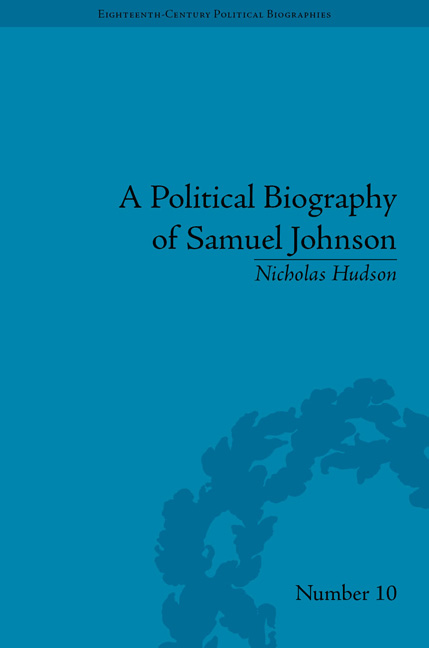Book contents
- Frontmatter
- CONTENTS
- Dedication
- Acknowledgements
- Note on the Text
- Introduction
- 1 Political Origins, 1709–36
- 2 The Patriot Opposition, 1737–9
- 3 An Independent Voice, 1740–55
- 4 The Seven Years War, 1756–63
- 5 Defender of King and State, 1763–70
- 6 Troubles of Empire, 1771–84
- Conclusion
- Notes
- Works Cited
- Index
4 - The Seven Years War, 1756–63
- Frontmatter
- CONTENTS
- Dedication
- Acknowledgements
- Note on the Text
- Introduction
- 1 Political Origins, 1709–36
- 2 The Patriot Opposition, 1737–9
- 3 An Independent Voice, 1740–55
- 4 The Seven Years War, 1756–63
- 5 Defender of King and State, 1763–70
- 6 Troubles of Empire, 1771–84
- Conclusion
- Notes
- Works Cited
- Index
Summary
The Literary Magazine
Although the publication of the Dictionary made Johnson an established literary figure, it did not lead to renewed happiness or prosperity. Drained both emotionally and physically, he entered a long period of frequent lethargy and indolence. After an energetic start, he neglected work on his next big project, a contracted edition of Shakespeare, to the point where he was publicly ridiculed in the early 1760s. His lonely house in Gough Square had been soon filled after Tetty's death with two new inhabitants who attest to Johnson's support for the lowly and downtrodden. The first was a young black man, Francis Barber, who had been born a slave to the father of Johnson's Ivy Lane Club friend Richard Bathurst. The second was Robert Levet, a coarse-mannered physician to the poor. Financially, Johnson seemed unconsciously inclined to repeat his father's improvidence and bankruptcy. The author of A Dictionary of the English Language was arrested for debt on 16 May 1756, and had to be sprung by a friend who knew better how to count his pennies, the novelist and printer Samuel Richardson. The printer of the Dictionary, William Strahan, was suspiciously ‘not at home’ when Johnson sent a message from the bailiff's house.
This date is interesting because Johnson had begun pouring out material for a new journal, the Literary Magazine, just the previous month. Politics, along with the immediate lack of money, could spur Johnson into activity if longer term projects could not.
- Type
- Chapter
- Information
- A Political Biography of Samuel Johnson , pp. 89 - 118Publisher: Pickering & ChattoFirst published in: 2014



